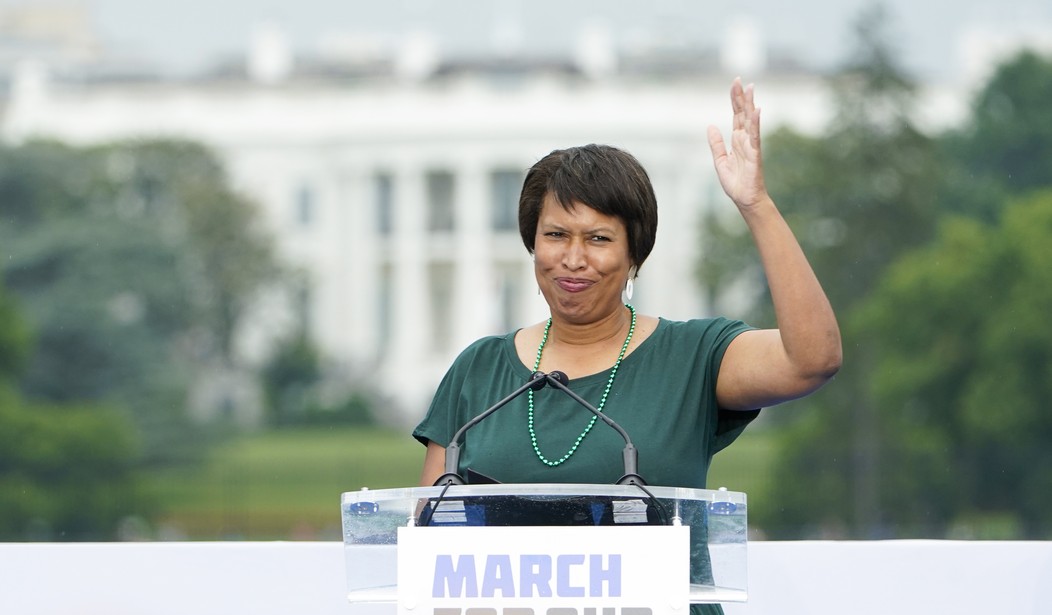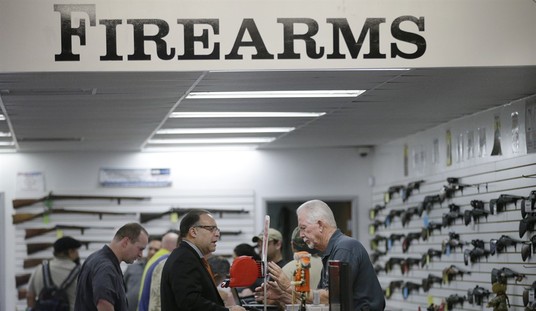While many U.S. cities are seeing a drop in violent crime after three years of rising numbers of carjackings, armed robberies, and homicides, Washington, D.C. is bucking the trend. The nation’s capitol is on pace for its deadliest year in almost two decades, but the Democrats in charge are divided on what exactly to do about it.
If the D.C. City Council could pass an ordinance that would make every gun (legally owned or illegally possessed) in the District disappear overnight, I’m sure it would be unanimously approved. But that’s not how gun control works, and despite the restrictive laws on both gun possession and lawful carry D.C. is home to plenty of individuals who are keeping and bearing arms without complying with the local gun registration and permitting requirements. Now the question for city council members is what to do about it, and on that the council is bitterly divided.
The D.C. mayor’s legislative proposal that would impose new penalties for gun crimes and make it easier to detain some youths awaiting trial encountered fierce resistance at a council hearing Tuesday, even as the city’s top federal prosecutor and a host of residents said the bill would help reduce violent crime in the nation’s capital.
D.C. Council member Janeese Lewis George (D-Ward 4) said the proposed legislation would be “incredibly traumatizing” to children. Two others — Robert C. White Jr. (D-At Large) and Christina Henderson (I-At Large) — referenced the mass incarceration of the 1980s and 1990s and said the bill could repeat mistakes of the past. And a representative from the American Civil Liberties Union of D.C. said it “contradicts the principles of human decency.”
D.C. Deputy Mayor Lindsey Appiah, in a draft of her testimony, acknowledged concerns that the bill would “turn back the clock to the bygone era of tough on crime practices,” but insisted that the city could increase accountability without resorting to mass incarceration.
“These unacceptable crime increases are occurring amid the backdrop of significant decreases in MPD sworn staffing and despite historic and unmatched investments in violence intervention and prevention,” Appiah said in the draft of her testimony, using an abbreviation for the D.C. police department. “It’s time to pivot.”
On one side you have D.C. Mayor Muriel Bowser and her allies who want to add more laws to the books, including several new, non-violent possessory firearms offenses. On the other side are council members who, while voicing all kinds of objections about gun ownership and the right to keep and bear arms, take issue with enforcing gun control (and other) laws, especially if doing so can lead to incarceration for defendants. As Matthew Yglesias pointed out earlier this week, nearly half of all arrests in D.C. for carrying without a license and unlawful possession of a firearm aren’t being prosecuted, but Democrats are divided about whether or not that’s a good thing.
One common view in the criminal justice reform community holds that this is good. My councilmember, Brooke Pinto, was recently accused by the D.C. Justice Lab of excessive focus on “possessory offenses not violence prevention.”
This is deeply wrongheaded, and the national constituency of people who think gun control has a role to play in public safety needs to understand that this is where many reformers are coming from. It seems to me that the connection between people cruising around town with illegal guns and violence prevention is extremely clear — interpersonal disputes conducted with guns are much more deadly than disputes conducted without guns, so strongly discouraging people from carrying guns is a good way to reduce lethal violence.
There is, of course, a third way, but one that would likely be unacceptable to both fans of gun control like Yglesias and those Democrats who believe that large numbers of arrests for mere possessory crimes are a terrible way to reduce acts of violence: encourage a culture of lawful gun ownership in the District of Columbia instead of continuing the decades-long attempt to make guns taboo.
Fifteen years after the Heller decision D.C. is still making it incredibly difficult and burdensome to lawfully possess a firearm. There are only a couple of FFLs in Washington, D.C., and those specialize more in transfers than retail sales, so folks hoping to purchase a firearm typically must venture outside the District and into Virginia or Maryland just to make their purchase, and then have it transferred to one of the two FFLs in D.C. to complete their purchase and begin their registration process.
Similarly, there are no ranges at all open to the public in D.C., so anyone wanting to apply for their concealed carry license has to once again leave the District and head to the wilds of the northern Virginia suburbs or cross the Anacostia or Potomac rivers and hit up a range in Maryland in order to obtain the training required under D.C.’s carry statute.
It’s going to be difficult if not outright impossible for many D.C. residents to navigate the bureaucratic maze that officials have created, especially for those reliant on public transportation to get around. I’d argue that these conditions are actually helping to create the unlawful possession and carrying of firearms that District officials are ostensibly trying to combat. If D.C. wants to reduce the number of illegally possessed firearms, how about helping people become legal gun owners instead of criminalizing their right to keep and bear arms?
As I said, the D.C. City Council will never go for this. Instead, they’d rather argue over new gun control laws and whether or not they should be enforced, even if the end result is a toothless criminal justice system that all too often turns a blind eye to both possessory offenses and violent crime. The Democrats may be divided on whether those laws should be enforced, but it’s clear that the current broken system is preferable to them if the alternative is acknowledging the fundamental right to armed self-defense and building a culture of responsible gun ownership that includes easy access to training and education and leads to more District residents lawfully exercising their Second Amendment rights.









Join the conversation as a VIP Member